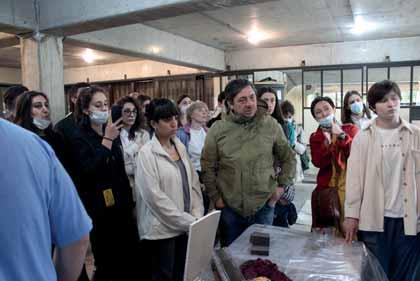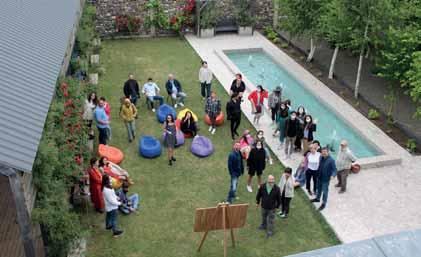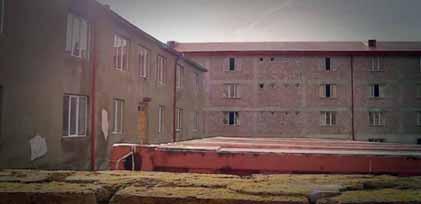
10 minute read
BUSINESS
from Issue #1300
Education for Sustainable Development: Bazaleti Green Engineering Center's Collaboration with Youth
BY ANA DUMBADZE
Advertisement
In order to achieve sustainable human development and solve the energy and environmental issues of common concern in the world, green building has become a necessary form of future building development. Nowadays, countries worldwide strive to widely introduce the elements of green architecture in their economies, and Georgia is also a part of this global trend. Considering that this fi eld is relatively new to the country, the role and activities of organizations that serve this goal becomes especially important.
One of the pioneers and initiators in the fi eld locally, the Bazaleti Green Engineering Center, which has long been actively sharing its knowledge and experience through various campaigns to raise awareness about sustainable architecture and building a circular economy, organized yet another important educational event on June 4-5, on the occasion of World Environment Day, in collaboration with the Caucasus School of Technology Architecture Program.
The two-day event, aimed at raising awareness and deepening knowledge about the combination of ‘green’ skills and modern technologies, brought together students of the Faculty of Architecture of Caucasus University, International Black Sea University, University of Georgia, and Ilia State University. Informing the young generation about nature-based solutions, perspectives of their use in Georgia, and the integration of sustainable development principles for creating successful business models was the main goal of the event.
The participants and supporters of the event included CENN, ‘New Technologies Center,’ the Green Building Council Georgia (GBC), Association Forest Products, project studios DMARK, Escoes, and Meti Development.
As part of the educational event, participants had an opportunity to attend special seminars and workshops conducted by highly experienced mentors, attend public lectures, and take part in various environmental activities.
The fi rst day of the event held at Caucasus University saw welcoming speeches by management and professors of the Faculty of Architecture of the University, introducing the activities of the Caucasus Environmental NGO (CENN), the role of the Forest Products Association in sustainable development, the principles of multi-apartment residential building planning considering sustainable initiatives, creating a bird-friendly urban environment, certifi cation of green buildings, examples of green projects implemented in Georgia, such as ‘Business House’ – LEED certifi cation, land architecture, philosophy of sustainable design, NBS -Nature Based Solutions and prospects of their use in Georgia, and more. Most importantly, students of the faculty had an opportunity to deliver speeches themselves and introduce their views and initiatives for achieving sustainable development.
At the end of the event, working groups of students were created, who headed to Bazaleti Green Engineering Center the next day to carry out practical works and perform various special tasks given by their mentors.
After discovering the Bazaleti Green Engineering Center and its eco-friendly solutions, the students started performing group work together with their mentors in parallel with free environmental activities on the shores of beautiful Bazaleti Lake. The students enjoyed planted trees, and, together with Architecture Doctor Gvantsa Kheladze, planted several seedlings of rare trees in the yard of the Center to express their love of nature and to celebrate the World Environment Day.
The culmination of the event saw presentations given of the students’ ecofriendly and creative works based on the tasks received by mentors, including: “birds’ dining house” arranged on a tree; compressed soil earth bricks; an energy effi cient university campus project; a house project using energy effi cient solutions; and a trombe wall for generating and maintaining heat in the building. The latter merited special approval from the evaluators and the representatives of the Bazaleti Green Engineering Center, however, as Center Founder Zaal Kheladze said at the end of the event, on this day, all the participant students were winners and victorious due to their creativity and environment-friendly ideas. He wished them success and expressed readiness for collaboration with the young generations interested in the sustainable development of the country.
“Our center and I personally are always ready to consult, advice and share our knowledge with all interested members of society, especially the youth. They can visit our center, ask for advice in their future projects and activities, contact us via our hotline, and collaborate with us, so that together we can build a greener and healthier economy for our country,” Kheladze concluded.
He told GEORGIA TODAY that such informational meetings and events are important for fi nding and connecting with future professionals in the fi eld.
“In our work, the decision-makers are architects and engineers. The challenge we see today is a lack of academic, highly experienced professionals. This also applies to other fi elds, so now we need professionals and academic staff, especially when we have an ambition to develop green technologies in the country. We want to fi nd professionals for collaboration on the local level, that’s why active information campaigns are being organized with young people from various fi elds.
“About 15 years ago, our center was the fi rst organization to launch seminars in green journalism and to organize a competition. We’ve had active collaboration with architects and engineers, organizing conferences and seminars for them. Such events signifi cantly contributed to increasing their sense of responsibility in terms of environmental protection. It will continue so in the future, as the green lifestyle is for everyone, and one of the main goals of our center is to develop that sense of responsibility and care for natural resources within society.
“We started collaboration with universities quite a long time ago. In 2008, together with Technical University, the ‘Laboratory of Green Engineering’ was

Today, we are all winners. These young people came up with many interesting ideas, proving themselves consistent professionals. – Zaal Kheladze
founded. An active relationship with young generations is always important, as they are our potential colleagues and partners. In the future, to increase awareness, we’re planning on creating a special platform, where syllabuses with relevant information will be published, to help interested professors and students in their studies. We have such platform, but for school teachers. Now we’re going to move on to the next level. This is our future goal,” he told us.
The Green Engineering Center has other exciting future plans, including holding a contest entitled ‘Green Wine Enterprise 2021,’ aimed at developing “green” production of wine, with a gradual expansion of the contest to cover more and more areas, and building an energy effi cient heaters and heating systems factory near the Bazaleti Center, in the mountains, as such products are especially necessary for the population living there. They are eager to set up a vocational education institution on the basis of the enterprise, which will contribute to educating young professionals in specifi c areas, such as welding, electrics, etc.
The doors of the center are open for all environment protection enthusiasts. Further, the space can be hired for conferences or meetings, allowing businesspersons to share the practical experience of the center in terms of sustainable architecture and environmental protection.
SOCIETY The Ninotsminda Orphanage Case
Continued from page 1
“Meanwhile, social workers and specialists of the relevant state monitoring institutions should conduct regular visits to all institutions to provide a professional assessment on the safety and well-being of children.
“Children placed in the institutions should have access to a complaints mechanism to report abuse and misconduct.
“Individual plans for children placed in institutions should be formulated to determine relevant alternative care services and the professional support required. Relevant alternative care and family support services should be strengthened to support these children after their leaving the institution, as well as their families and professionals working with them.
“Relevant actors should respect the right of all children and their families to privacy at all stages of the deinstitutionalization process,” the UNICEF statement reads.
The organization went on to note that it stands ready to support constructive dialogue between different partners around deinstitutionalization and effective family support services. Any support should be directed towards strengthening families and keeping children in families rather than funding largescale care facilities.
“In the long-term perspective, UNICEF will support evidence generation of the push and pull factors for children’s institutionalization, assist relevant actors in the development of the de-institutionalization action plan and its implementation, and will support the strengthening of family support services.”
The State Agency for Care and Assistance of Victims of Traffi cking said this week that 20 minors have left the Ninotsminda Orphanage-boarding school, seven of whom are children with disabilities. In their best interests, they have been transferred to other forms of care, such as to their biological families, small family-type houses, or foster care.
In the meantime, the Public Defender’s Offi ce continues to study the rights protection of children in the Ninotsminda boarding school. Based on the information received, investigations were launched into four criminal cases of alleged abuse of minors in 2016-2021. Three cases concern alleged violence (Article 126 of the Criminal Code) and one case concerns alleged rape (Article 137 of the Criminal Code).
At this stage, the Public Defender's Offi ce says it does not have detailed information about the alleged offenses, circumstances, the persons involved, or the measures taken in response. The Public Defender's Offi ce has already applied to the responsible agencies for the purpose of obtaining said information. “Despite evidence of child abuse, and the several ongoing criminal cases, including one for the rape of a minor, the doors of the Church-run Ninotsminda Orphanage remained closed to public scrutiny. Even Georgia’s Public Defender was barred from investigating what was happening at the orphanage,” OC Media reported in an article dated June 3.
“On 1 June, a protest was held in front of the Chancellery of the Government of Georgia, where about 100 people demanded that the conditions within the Ninotsminda Orphanage, a closed religious boarding house, must be investigated and made public. However, neither the Public Defender of Georgia, Nino Lomjaria, nor the Public Defender’s monitoring group have been allowed to meet with the children staying at the orphanage,” reads the article.
The refusals are said to have come directly from the Archbishop of Skhalta, Reverend Spiridon, who is alleged to have held the Prosecutor Public Defender's Offi ce’s supportive stance toward the LGBT community against them.
Yet, this week, the Georgian Patriarchate appealed to the Ministry of Internal Affairs to make public the details of the criminal case related to the Ninotsminda boarding school.
“Based on the Public Defender's statement, it recently became known to us and the public that criminal cases have been launched in the Ministry of Internal Affairs in connection with the Ninotsminda boarding school,” they announced.
“We appeal to the relevant service of the Ministry of Internal Affairs to make these cases public so that nothing is hidden from anyone and speculation does not take place.”
Mikheil Sarjveladze, Chairman of the Committee on Human Rights and Civil Integration, noted that “as a result of the involvement of the Ministry of Health, none of the children in the Ninotsminda children's boarding school is in danger and there is no reason to be nervous.”
“Currently, the Ministry of Health has virtually every leverage, both legal and factual, so that we can say with absolute certainty that none of the children in the boarding school is in any danger. Work will continue to ensure that the Public Defender can actually monitor the situation in the boarding school,” he said.
“After the child care service was given the opportunity to enter the Ninotsminda Orphanage and carry out its activities, six juveniles expressed their desire to leave the institution,” the State Agency for Care and Assistance of Victims of Traffi cking announced on June 4. “Intensive work is currently underway, and up to 10 more children have been identifi ed to be transferred. Psychologists of the agency are also involved,” reads the statement.
On June 7, the same agency reported that 20 minors had left the Ninotsminda Orphanage, seven of whom are children with disabilities.






